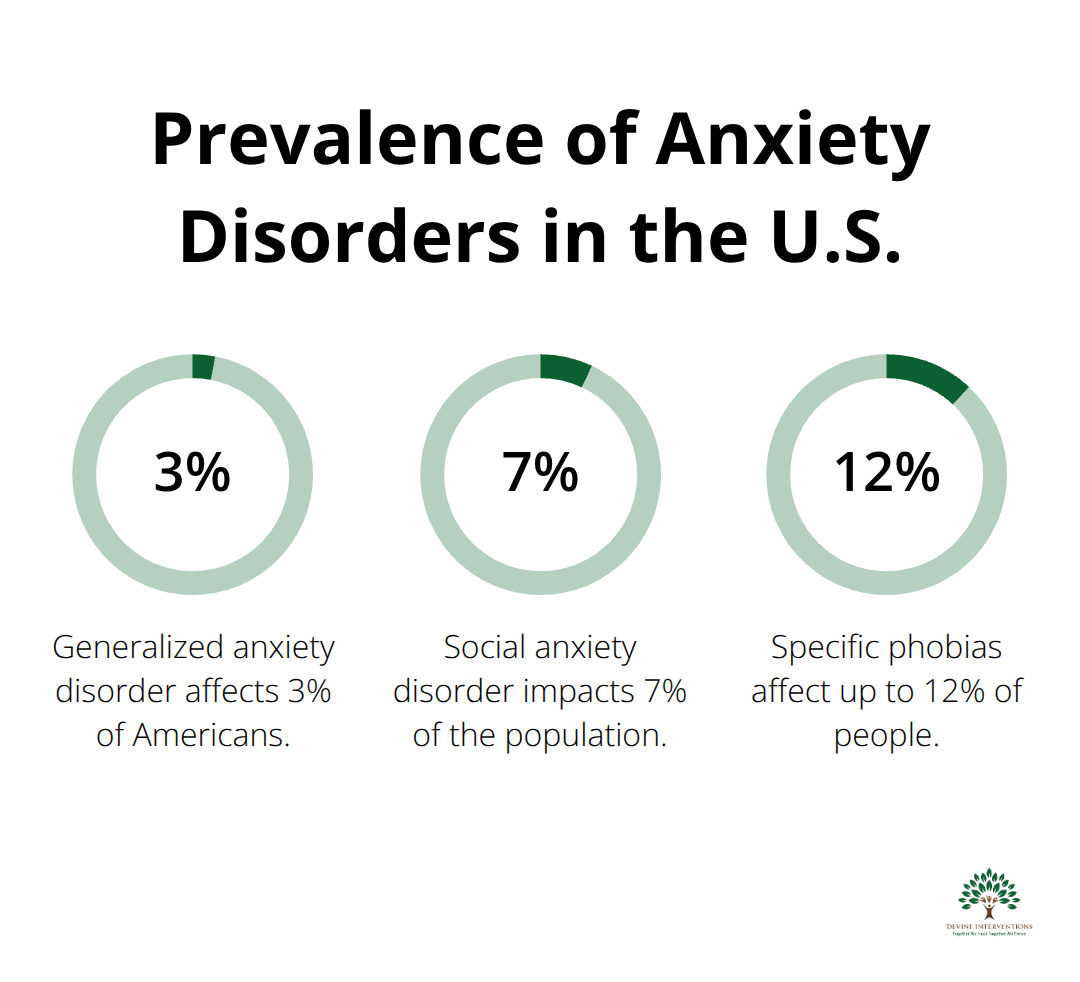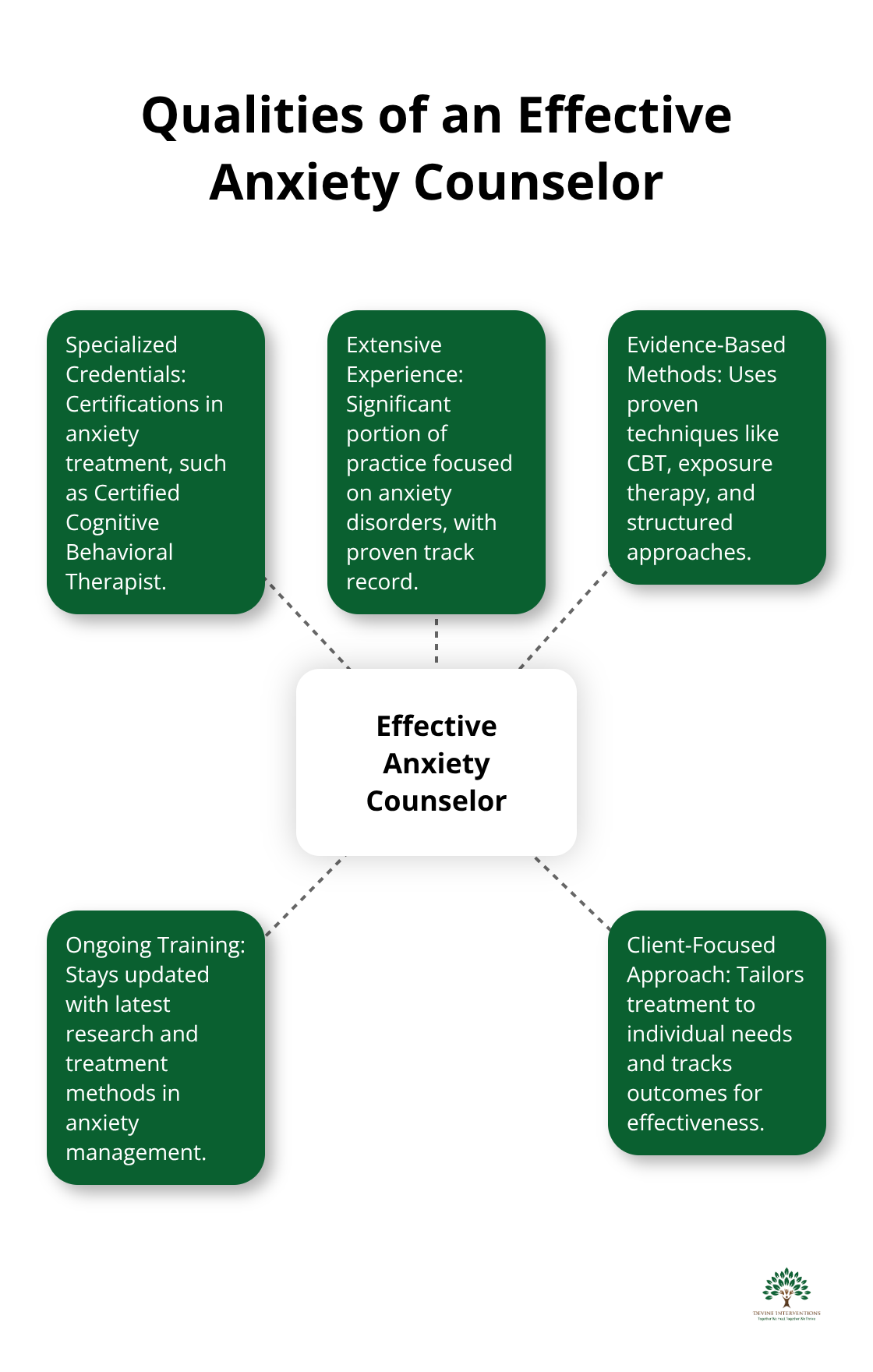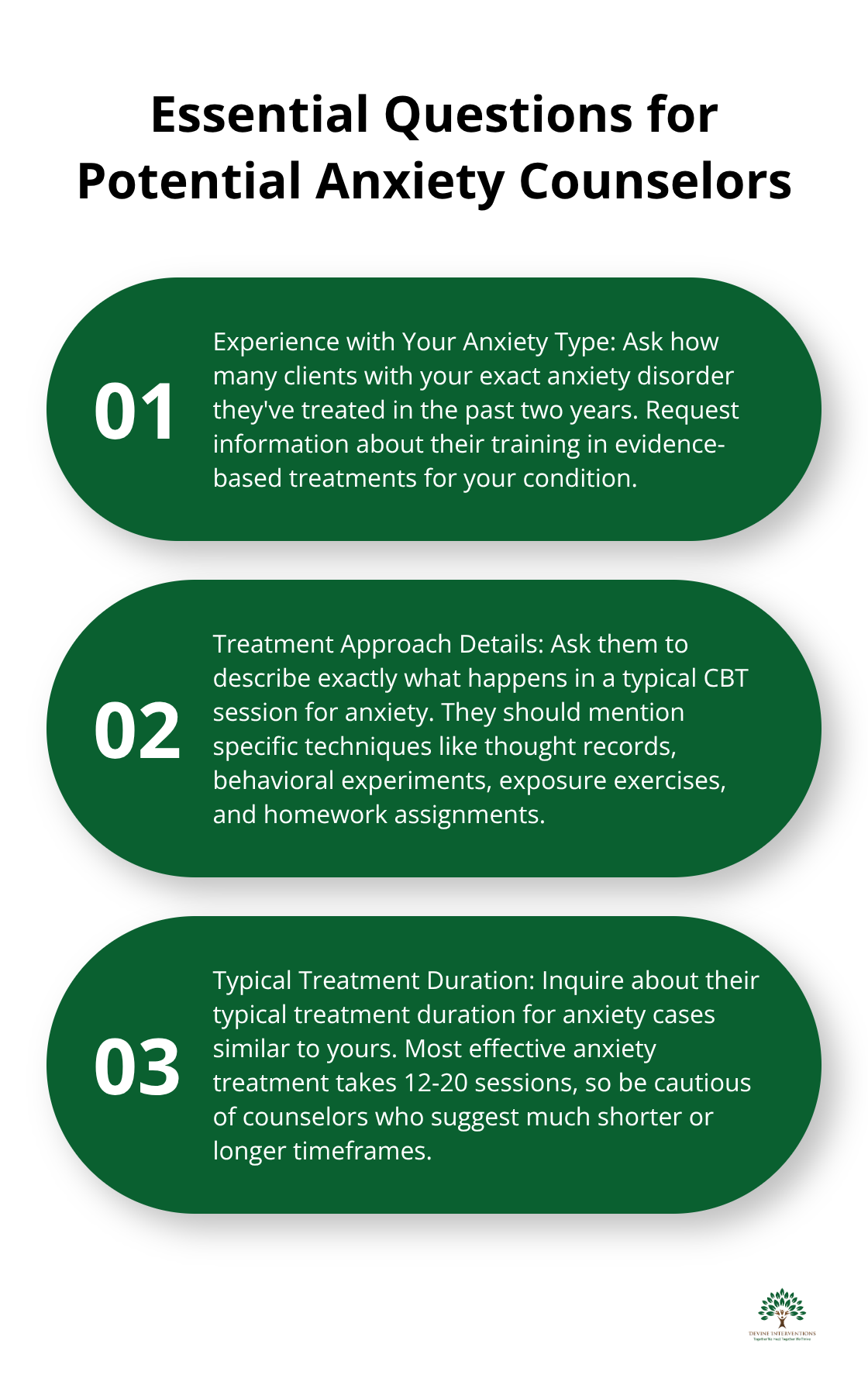Finding the right therapist for your anxiety can feel overwhelming when you’re already struggling with worry and stress. The good news is that individual anxiety counseling has helped millions of people regain control of their lives.
At Devine Interventions, we understand that choosing the right counselor is a personal decision that requires careful consideration. This guide will walk you through the essential steps to find a therapist who truly understands your needs.
What Type of Anxiety Help Do You Need?
Before you start calling therapists, you need to get specific about your anxiety patterns. Research shows that about 6% of adults had experienced moderate or severe symptoms of anxiety in the past 2 weeks, but each person’s experience looks different. Track your symptoms for one week with a simple notebook or phone app. Write down when anxiety hits, what triggers it, and how intense it feels on a scale of 1-10. This data becomes your roadmap for the right therapist.
Know Your Anxiety Type
Generalized anxiety disorder affects 3% of Americans and shows up as constant worry about everyday situations. Social anxiety disorder impacts 7% of the population and centers around fear of social interactions. Specific phobias affect up to 12% of people and involve intense fear of particular objects or situations. Your anxiety type determines which therapists can help you most effectively. A therapist who specializes in social anxiety might not be the best fit for panic disorder (the treatment approaches differ significantly). Get clear on your specific anxiety pattern before you make calls.

Match Your Treatment Intensity
Your anxiety severity determines the level of care you need. Mild anxiety that doesn’t interfere with work or relationships responds well to weekly individual therapy sessions. Moderate anxiety that affects your daily life might benefit from twice-weekly sessions or group therapy combined with individual work. Severe anxiety that prevents you from leaving home or working requires intensive outpatient programs or partial hospitalization. Most therapists offer different treatment intensities, but not all specialize in severe cases. Be honest about how much your anxiety disrupts your life when you speak with potential counselors.
Choose Your Therapy Style
Cognitive Behavioral Therapy has proven effectiveness across a diverse range of clinical diagnoses according to recent research. CBT focuses on changing thought patterns and behaviors that fuel anxiety. Exposure therapy helps people face their fears gradually in controlled settings. Acceptance and Commitment Therapy teaches you to live with anxiety rather than eliminate it completely. Some people prefer structured, homework-based approaches while others want more conversational therapy styles. Your personality and learning style should guide this choice (not what sounds most appealing online).
Once you understand your specific needs and preferences, you can start evaluating potential counselors based on their qualifications and expertise.
What Makes a Great Anxiety Counselor
The difference between years of struggle and real relief often comes down to three non-negotiable factors in your counselor selection. Licensed Professional Counselors and Licensed Clinical Social Workers represent the minimum credential standard, but anxiety management requires specialized training beyond basic licensing. According to the Anxiety and Depression Association of America, therapists with specific anxiety disorder certifications show significantly better treatment outcomes. Look for credentials like Certified Cognitive Behavioral Therapist or specialized training in exposure therapy. These certifications require hundreds of additional training hours focused specifically on anxiety treatment methods.
Experience Beats General Practice
A therapist who treats everything treats nothing well. Your social anxiety needs a counselor who has worked with dozens of social anxiety cases, not someone who occasionally sees anxious clients between depression and relationship cases. Ask potential therapists how many anxiety clients they currently see and what percentage of their practice focuses on anxiety disorders. The best anxiety counselors maintain caseloads where a significant portion of clients present with anxiety as their primary concern (this specialization makes all the difference). Request specific numbers about their experience with your anxiety type. A therapist who has treated panic disorder for five years will understand the nuances that a generalist misses completely.
Treatment Methods That Actually Work
Cognitive Behavioral Therapy shows effectiveness rates for anxiety disorders according to recent clinical research, but not all CBT therapists are equal. Ask about their specific CBT training and whether they use exposure therapy techniques. Exposure and Response Prevention has proven particularly effective for specific phobias and OCD-related anxiety. Some therapists claim they use CBT but actually provide general talk therapy with CBT language. Request details about homework assignments, thought records, and behavioral experiments they use in treatment. Real CBT therapists will describe concrete techniques and structured approaches rather than vague therapeutic concepts.

Red Flags to Avoid
Watch out for therapists who promise quick fixes or guarantee specific timelines for recovery. Anxiety treatment typically takes 12-20 sessions for noticeable improvement, and anyone who promises faster results likely lacks experience with anxiety disorders. Avoid counselors who seem uncomfortable discussing medication options or refuse to coordinate with psychiatrists when needed. Many anxiety cases benefit from combined therapy and medication approaches (especially severe cases). Skip therapists who focus primarily on childhood trauma when you need present-moment anxiety management skills. While past experiences matter, effective anxiety treatment addresses current symptoms and coping strategies first.
Now that you know what qualifications to seek, you need specific questions that will help you evaluate whether each potential counselor meets your standards.
What Questions Should You Ask Potential Counselors
The difference between an effective anxiety counselor and months with the wrong therapist comes down to specific questions during your initial consultation. Start with their anxiety caseload numbers. Ask how many current clients they treat for anxiety disorders and what percentage of their practice focuses specifically on anxiety treatment. A qualified anxiety specialist should maintain at least 60% of their caseload with anxiety-related conditions. Request details about their success rates with your specific anxiety type. If you have social anxiety, ask how many social anxiety clients they’ve treated in the past year and what their typical treatment timeline looks like. Effective anxiety counselors track their outcomes and provide concrete numbers about client improvement rates.
Treatment Methods and Philosophy
Push beyond general therapy descriptions and demand specifics about their treatment approach. Ask them to describe exactly what happens in a typical CBT session for anxiety. They should mention specific techniques like thought records, behavioral experiments, exposure exercises, and homework assignments. Request information about their exposure therapy experience if you have phobias or panic disorder. A qualified therapist will explain their gradual exposure process and safety protocols (this shows real expertise). Ask about their philosophy on medication coordination. The best anxiety counselors work closely with psychiatrists when needed and can explain when they typically recommend medication evaluation.
Experience with Your Anxiety Type
Get specific about their track record with cases like yours. Ask how many clients with your exact anxiety disorder they’ve treated in the past two years. Request information about their training in evidence-based treatments for your condition. A therapist who specializes in generalized anxiety might lack experience with panic attacks or social phobias. Ask them to describe their most challenging anxiety case and how they handled it. Their response reveals both their experience level and problem-solving approach (you want someone who stays calm under pressure).
Practical Logistics That Matter
Get specific about availability and policies before you commit. Ask about their flexibility for urgent situations between sessions and how they handle anxiety crises. Request detailed fee information including session costs, insurance procedures, and payment plans. Ask if they provide superbills for out-of-network reimbursement and whether they offer sliding scale fees. Inquire about their typical treatment duration for anxiety cases similar to yours. Most effective anxiety treatment takes 12-20 sessions, and counselors who suggest much shorter or longer timeframes may lack specialized anxiety experience. Consider preparing for your first therapy session to maximize these initial consultations.

Final Thoughts
The right individual anxiety counseling matches your specific needs with a qualified specialist who uses evidence-based treatments. The most important factors include verified credentials in anxiety disorders, substantial experience with your anxiety type, and proven treatment methods like CBT or exposure therapy. Your counselor should maintain a caseload where anxiety represents the majority of their practice and provide concrete details about their treatment approach.
The therapeutic relationship makes the difference between continued struggle and genuine recovery. Trust your instincts during consultations and prioritize counselors who answer your questions with specific examples rather than vague promises. Effective anxiety treatment typically takes 12-20 sessions, and the right therapist will set realistic expectations while tracking your progress (this transparency shows their expertise).
Your anxiety doesn’t have to control your life. We at Devine Interventions specialize in comprehensive anxiety treatment using evidence-based approaches tailored to your specific needs. Contact us today to schedule your initial consultation and take the first step toward reclaiming control of your life.







